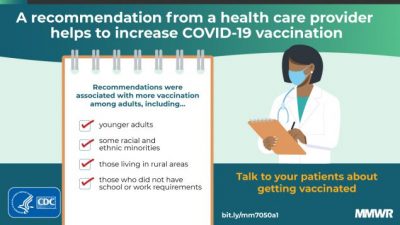Provider recommendations boost likelihood of COVID-19 vaccination
January 14, 2022
People who receive COVID-19 vaccine recommendations from their doctor or health care provider are more likely to get vaccinated, according to a new report from the Centers for Disease Control and Prevention (CDC).
This is an important finding for public health experts, who are struggling to confront diminishing COVID-19 vaccination rates and mitigate the spread of misinformation that can contribute to vaccine hesitancy. Providers have long played a key role in improving attitudes toward vaccination. Their recommendations will continue to be a powerful tool in the ongoing response to the coronavirus pandemic.

Dr. Noel Brewer
The Morbidity and Mortality Weekly Report, released by the CDC in late December 2021, features research from Noel Brewer, PhD, Gillings Distinguished Professor in Public Health and professor of health behavior at the UNC Gillings School of Global Public Health. Brewer, one of the world’s top researchers on vaccine communication and uptake, is part of the CDC’s Vaccine Confidence Work Group and has worked with colleagues to pioneer the Announcement Approach Training, which teaches health care providers to communicate more effectively about vaccination.
The CDC analyzed data from a telephone survey that assessed reports of health care provider recommendation for COVID-19 vaccination, COVID-19 vaccination status and attitudes toward vaccination among adults in the United States. These attitudes included concern about infection risk, belief in the importance and safety of vaccination and belief about how many family members and friends have been vaccinated.
The study found that provider recommendations were associated with a higher likelihood of vaccination.

Centers for Disease Control and Prevention: A recommendation from a health care provider helps to increase COVID-19 vaccination
During the study period, provider recommendations increased from 34.6 percent to 40.5 percent, and those who received a provider recommendation were more likely to have received at least one dose of the COVID-19 vaccine (77.6 percent) compared to those who did not receive a recommendation (61.9 percent).
This increase was most significant among adults under the age of 40; those who identified as non-Hispanic American Indian or Alaska Native; people living in rural areas, the West or Midwest; and those who were not given a vaccination mandate by their school or work.
Provider recommendations were also correlated with a higher likelihood of concern about COVID-19, confidence in the safety and effectiveness of the vaccine, and belief that friends or family were also vaccinated.
While these results demonstrate just how much value patients place in the judgment of their personal doctors, less than half of study participants reported receiving a vaccine recommendation from a health care provider.
“COVID-19 broke the primary care model for vaccination. Many people weren’t going to their doctors, and a lot of the nation’s COVID-19 vaccination happened instead at temporary vaccination centers and pharmacies,” said Brewer. “The lack of provider recommendations is a big opportunity for primary care to boost vaccine uptake.”
As COVID-19 vaccines become more available in primary care settings, clinicians should use each encounter with a patient as an opportunity to encourage vaccination, particularly because structural barriers prevent many people from regularly visiting a trusted provider. Such interactions, especially with groups that have lower vaccination coverage, will be crucial to reducing the harm caused by COVID-19 and increasing confidence in vaccination.
“People need to talk to their providers to get advice on what to do about COVID-19 vaccination,” said Brewer. “Providers need to be ready with a listening ear, up-to-date information on the vaccines’ safety and effectiveness, and gentle but firm advice to get vaccinated today.”
Contact the UNC Gillings School of Global Public Health communications team at sphcomm@unc.edu.
